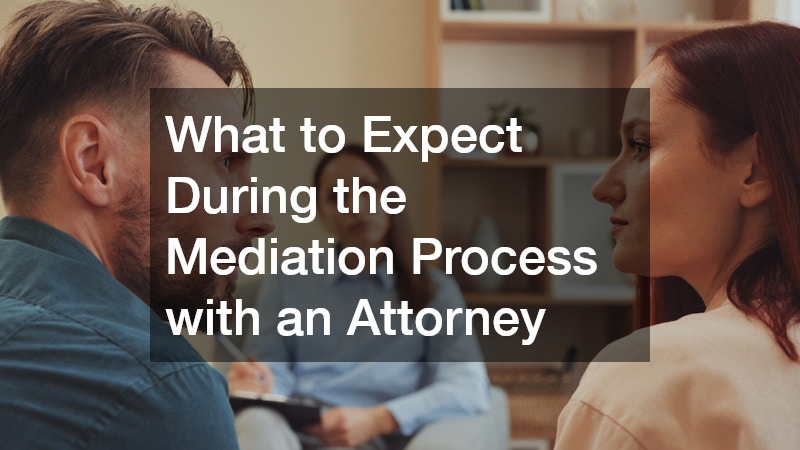
-
Divorce mediation is less adversarial than litigation, but having the right attorney ensures your rights and interests are fully protected.
-
Look for attorneys with specific experience in mediation, not just courtroom litigation.
-
Key qualities to prioritize include strong communication skills, empathy, transparency, and knowledge of family law.
-
Always verify credentials, client reviews, and professional affiliations (such as the American Bar Association Family Law Section).
-
Prepare a list of questions and compare multiple attorneys before making your decision.
-
The right attorney can help you achieve a fair, cost-effective, and faster resolution while preserving family relationships.
Why the Right Divorce Attorney Matters in Mediation

When you need to recommend a divorce attorney for mediation services—or choose one yourself—the decision can significantly impact the outcome of your case. Divorce is never easy, but the approach couples take determines how stressful, costly, and drawn-out the process will be. In the United States, mediation is becoming a preferred path, allowing both spouses to work with a neutral third party (the mediator) to resolve disputes over property division, child custody, and support without the courtroom battles of traditional litigation.
According to the American Bar Association, over 70% of couples who choose mediation reach a full settlement and report greater satisfaction with the process compared to litigation (ABA, Family Law Section Report). Mediation not only reduces legal expenses but also shortens the divorce timeline, often concluding in weeks or months instead of years. These numbers highlight why working with the right attorney is crucial—someone who can protect your legal rights, explain complex terms, and help you navigate emotional challenges throughout the mediation process.
But not all attorneys bring the same skills. While some thrive in courtroom litigation, others specialize in guiding clients through mediation with a focus on collaboration and fairness. This guide offers a step-by-step resource for anyone in the U.S. looking to select the right divorce attorney for mediation.
Understanding Divorce Mediation
What is Divorce Mediation?
Divorce mediation is a voluntary process where a neutral third party—the mediator—helps divorcing spouses reach an agreement on key issues. Unlike a judge in court, the mediator doesn’t impose decisions. Instead, they facilitate conversations to help couples find mutually acceptable solutions.
Key areas addressed in mediation often include:
- Division of marital property and debts.
- Child custody arrangements and parenting schedules.
- Child support and spousal support.
- Future communication and co-parenting agreements.
Because the mediator cannot provide legal advice, each spouse is encouraged—or sometimes required—to have their own attorney. This is where the importance of finding the right attorney comes in.
Benefits of Mediation Over Litigation
Mediation offers significant benefits compared to traditional courtroom divorce:
- Cost savings: Court battles can easily cost tens of thousands of dollars, while mediation generally costs far less.
- Time efficiency: Many mediations conclude in a matter of weeks or months, compared to litigation that can drag on for years.
- Privacy: Mediation is confidential, unlike court cases, which become part of the public record.
- Reduced conflict: Instead of “winning” and “losing,” mediation promotes compromise and cooperation.
- Better outcomes for families: Mediation helps preserve relationships, particularly important for parents who must continue co-parenting.
The Role of an Attorney in Mediation
A common misconception is that you don’t need an attorney in mediation. While the mediator ensures fairness in the process, they cannot advise either spouse legally. A divorce attorney provides critical support by:
- Reviewing proposed agreements for fairness and legality.
- Ensuring state-specific laws are followed.
- Helping you understand your rights and obligations.
- Guiding you through financial disclosures.
- Advising you on long-term consequences of your settlement.
In short, while the mediator facilitates, your attorney safeguards your interests.
Why Choosing the Right Divorce Attorney Matters
Selecting the right attorney is not simply about having someone present during mediation. It’s about ensuring that the process works in your favor and doesn’t leave you at a disadvantage.
Risks of Choosing the Wrong Attorney
- Settling for unfair agreements that could impact your finances or custody rights.
- Spending more money on drawn-out processes if your attorney isn’t skilled in mediation.
- Increasing conflict if the attorney has a combative litigation mindset rather than a cooperative one.
Importance of Mediation-Specific Experience
Divorce law varies widely across U.S. states, and an attorney familiar with mediation knows how to balance protecting your rights with promoting resolution. Attorneys who are mediation-focused are better equipped to:
- Keep negotiations calm and productive.
- Prevent unnecessary disputes.
- Ensure agreements hold up in court if filed.
When you recommend a divorce attorney for mediation services, the emphasis should always be on their track record of achieving balanced, amicable results.
Key Qualities to Look for in a Divorce Mediation Attorney
Mediation-Specific Experience
An attorney with experience specifically in mediation understands the nuances that courtroom litigators may overlook. Look for:
- A history of successful mediation cases.
- Familiarity with collaborative divorce strategies.
- Membership in professional mediation or family law organizations.
Strong Communication & Negotiation Skills
Your attorney should be:
- Able to explain legal terms in plain English.
- Skilled in negotiation without escalating conflict.
- Comfortable mediating high-stakes issues like child custody or property division.
Knowledge of State Laws and Local Courts
Divorce law is not uniform across the U.S. Each state has different rules on:
- Division of assets (community property vs. equitable distribution states).
- Child support calculation methods.
- Spousal support guidelines.
- Residency requirements.
Hiring an attorney who practices in your state ensures compliance with local laws.
Empathy and Client-Centered Approach
Divorce is not just legal—it’s emotional. Attorneys who treat you with respect and empathy can make the process less overwhelming. Signs of a client-centered attorney include:
- Taking time to listen.
- Offering reassurance without false promises.
- Respecting your goals and preferences.
Transparency on Costs
A good attorney should be upfront about fees. Common billing models include:
- Flat fees for straightforward mediations.
- Hourly rates for complex or lengthy negotiations.
- Retainers with unused funds refundable.
Ask for a written fee agreement before committing.
Steps to Choosing the Right Attorney
Start With Research
- Use online legal directories like Avvo, FindLaw, or Martindale-Hubbell.
- Check your state’s bar association website to confirm licensing and disciplinary history.
- Look into nonprofit legal aid resources in your community.
Ask for Recommendations
- Seek referrals from trusted friends, family, or professionals who’ve gone through mediation.
- Therapists, financial advisors, or other attorneys often know reputable family law practitioners.
Read Client Reviews and Testimonials
When you recommend a divorce attorney for mediation services, testimonials provide real-world insights. Look for:
- Patterns of responsiveness and professionalism.
- Comments on fairness and negotiation skills.
- Warnings about delays, poor communication, or unprofessional behavior.
Interview Multiple Attorneys
Schedule consultations with at least two or three attorneys. This helps you:
- Compare personalities and communication styles.
- Assess their approach to mediation.
- Gauge whether they respect your goals.
Questions to Ask During Consultation
- How many mediation cases have you handled in the past year?
- What’s your success rate in reaching settlements?
- How do you handle high-conflict couples?
- How do you charge, and what’s the expected total cost?
- What should I expect during my first mediation session?
Common Mistakes to Avoid When Hiring a Divorce Mediation Attorney
- Choosing based on price alone: The cheapest option often lacks experience or skill.
- Hiring a litigation-heavy attorney: They may escalate conflict rather than reduce it.
- Ignoring compatibility: If you don’t feel comfortable with your attorney, communication will suffer.
- Skipping a background check: Always verify the attorney’s bar status and disciplinary record.
Cost of Hiring a Divorce Mediation Attorney in the U.S.
Attorney costs vary significantly depending on location, case complexity, and attorney experience.
- Hourly rates: Typically range from $250–$500 per hour.
- Flat fees: For simple cases, expect $1,500–$5,000.
- Mediation packages: Some attorneys offer bundled services that include preparation, sessions, and final agreement review.
Factors that influence costs:
- Number of mediation sessions required.
- Whether children and custody issues are involved.
- Complexity of property or financial matters.
Tip: Always ask for a written breakdown of costs before hiring.
What to Expect During the Mediation Process with an Attorney

Pre-Mediation Preparation
Your attorney will help you:
- Gather financial documents (tax returns, bank statements, property deeds).
- Identify your goals and deal-breakers.
- Prepare a list of assets and debts.
Mediation Sessions
- Opening statements: The mediator sets the tone.
- Negotiations: You and your spouse, with attorneys’ support, discuss each issue.
- Problem-solving: Attorneys provide input to help bridge gaps.
- Settlement drafting: Agreements are documented and reviewed.
Final Steps
- Attorneys review the agreement for fairness and compliance.
- Documents are filed with the court to finalize the divorce.
When Mediation Might Not Be the Best Option
Mediation is not suitable for every couple. Situations where mediation may fail include:
- Domestic violence or abuse: One spouse may feel unsafe or unable to negotiate fairly.
- Severe power imbalances: When one spouse dominates decision-making.
- Hidden assets: If one spouse conceals financial information.
- Unwillingness to compromise: Mediation only works if both parties participate in good faith.
In such cases, litigation may be necessary for protection and fairness.
Final Tips for Choosing the Right Divorce Mediation Attorney
- Take your time—don’t rush the decision.
- Trust your instincts as well as credentials.
- Prioritize attorneys with proven mediation experience.
- Ensure cost transparency from the start.
- Choose someone who balances legal expertise with compassion.
Conclusion
Divorce mediation offers couples a way to separate with dignity, reduce costs, and preserve family relationships. However, the success of the process often depends on having the right legal support. When you recommend a divorce attorney for mediation services, you are pointing someone toward a professional who can protect their rights while helping them achieve a fair resolution.
The right attorney will combine legal knowledge, communication skills, empathy, and transparency to guide you through each step of mediation. As the American Bar Association notes, family law attorneys who understand mediation can play a crucial role in balancing fairness with legal protections, ensuring agreements meet both legal and emotional needs (ABA Family Law Section). Beyond legal protections, mediation is also backed by strong evidence: according to the American Psychological Association, couples who mediate often report greater satisfaction with the outcome and stronger post-divorce relationships compared to those who litigate (APA on Divorce Mediation). In addition, the Cornell Law School Legal Information Institute highlights that mediation often leads to faster settlements, which can reduce stress and long-term financial strain for families (Cornell LII – Mediation).
By carefully researching, interviewing, and comparing your options, you can ensure that the attorney you choose will serve as a strong advocate and trusted advisor throughout your divorce journey.
FAQs – Choosing a Divorce Mediation Attorney in the U.S.
- Do I really need an attorney if I already have a mediator?
Yes. The mediator facilitates discussions but cannot give legal advice. An attorney ensures your rights are protected and agreements are fair. - How much does divorce mediation usually cost in the U.S.?
Most cases range from $3,000–$10,000 in total, depending on complexity and attorney fees, which is far less than litigation. - What happens if mediation fails?
If couples cannot reach an agreement, unresolved issues may proceed to court. Your attorney can seamlessly transition into representing you in litigation if needed. - Can both spouses use the same attorney in mediation?
No. Each spouse should have their own attorney, as one attorney cannot represent both sides without a conflict of interest. - How do I find affordable divorce mediation attorneys in my state?
Check local bar associations, nonprofit legal aid, or sliding-scale law clinics. Some states also offer community-based mediation programs with reduced attorney fees.
